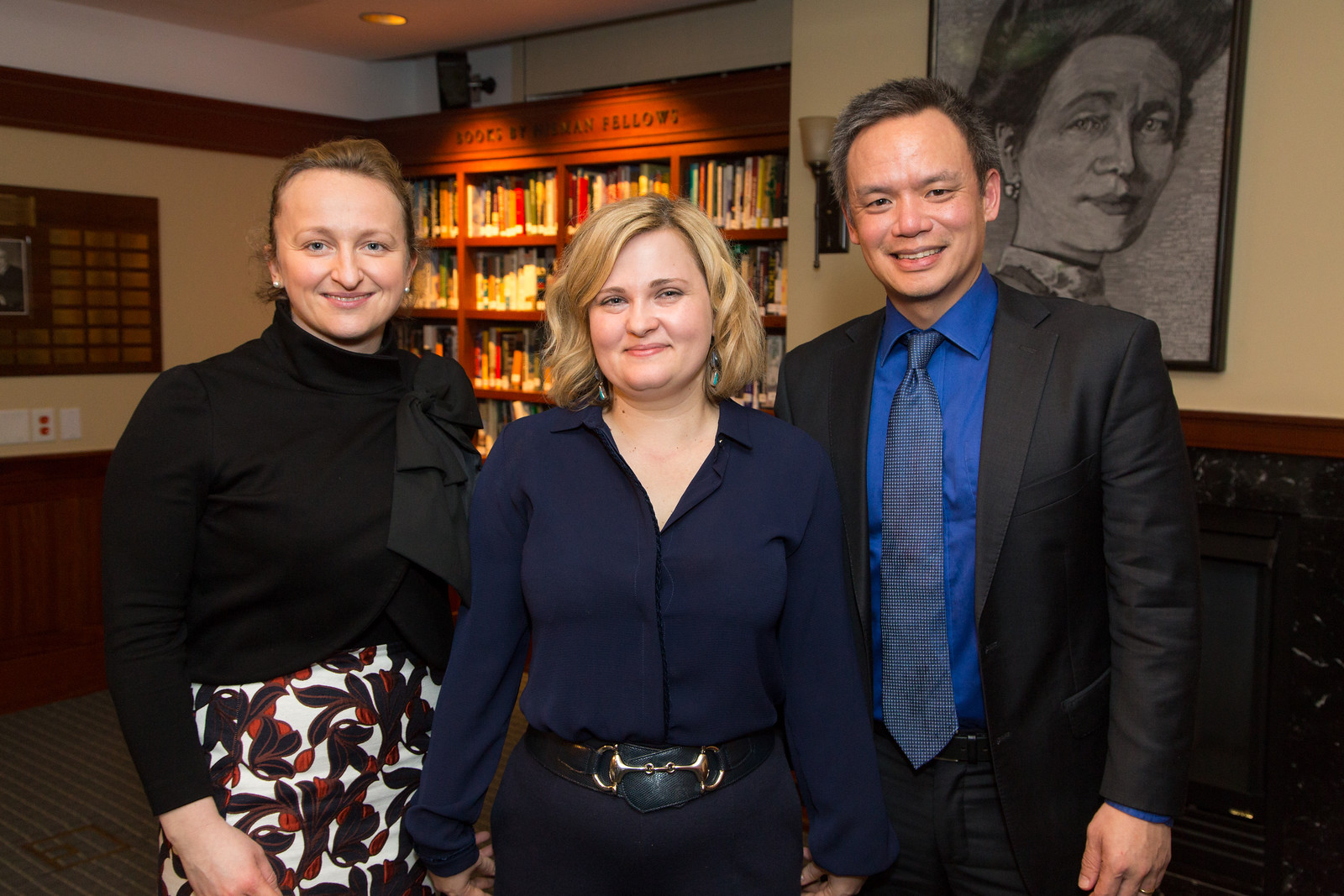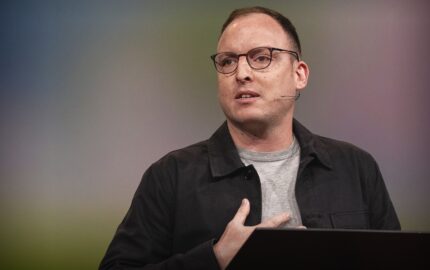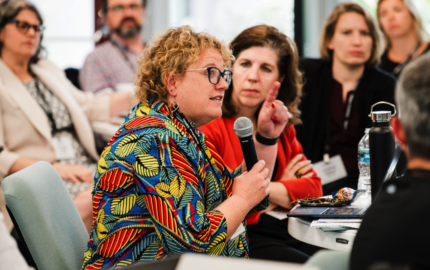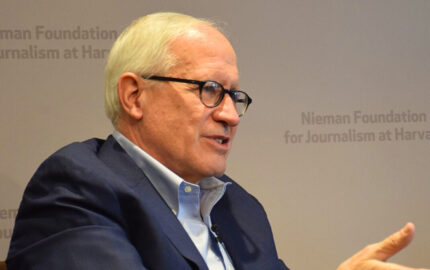
At a time when local TV news is often written off as formulaic, with sensationalism triumphing over substance, a look at stations that are going digital-first, crowdsourcing reporting, experimenting with augmented reality, and injecting more personality into the news.
Milashina spoke at the Nieman Foundation in February after she accepted the Louis M. Lyons Award for Conscience and Integrity in Journalism. She was chosen by the 2018 class of Nieman Fellows for her groundbreaking and persistent investigative reporting on human rights abuses in Russia while enduring threats from powerful figures.
During her remarks, she noted that she had the good fortune to start her journalism career in the “golden age of Russian media,” the brief period in the 1990s after Boris Yeltsin came to power when the nation had a free press.
Edited excerpts:
On covering the Kursk disaster
The Kursk [in which a Russian submarine exploded and sank in 2000, killing all 118 people onboard] was my first big story. I may be the only journalist in Russia who still cares about what happened back then in August 2000. The European court’s decision was very important for Russian media, because Russian authorities were trying to forbid me to write this story. [In October 2017, the European court of human rights ruled that Russia had violated Novaya Gazeta’s right to free expression. Earlier a Moscow district court had ruled against the paper.]
I never forget my stories, my heroes, no matter that people don’t pay attention. I still think that it’s very important to put all the pieces together and explain what really happened in that disaster.
On the killings of colleagues
Many journalists know of the murder in 2006 of Anna Politkovskaya, the most famous Russian journalist in the West, but she was not the first Novaya Gazeta journalist to be killed. The first was my editor Igor Domnikov in 2000 for his stories on Russian corruption. Two years later the investigative journalist Yuri Shchekochikhin, who also reported on corruption, was killed.
In 2009, my very dear friend Natalya Estemirova [a human rights activist and frequent contributor to Novaya Gazeta] was kidnapped and shot the day after I left her apartment. That same year my colleague Anastasia Baburova and the human rights lawyer Stanislav Markelov were murdered in Moscow.
The main thing that I understood when I was losing my friends and colleagues this way was that the Russian authorities won’t do anything to find and punish those who killed them.
The only thing that I can do to stop [the killings of journalists in Russia] is to continue the work so that the people who kill journalists understand that there will always be another journalist who will step up and continue the work.
On fear in Chechnya
If you want to get a sense of how people lived back in Stalin’s time, go and live in Chechnya now, and you will understand how scary life can be. It’s so scary that even people in other parts of Russia can’t imagine how life is for people in Chechnya.
When Anna Politkovskaya came to the region, people were standing in line to talk to her, to tell her their stories, and she was the voice for them. Ten years later, when I came to the region, people didn’t dare talk to journalists because they knew they would be punished the next day.
On the anti-gay campaign
In Chechnya the leader says publicly that his main mission is to clean the Chechen blood of gays, human rights defenders, journalists, and people who use drugs.
My story began with one story of one guy—he was a TV person, a showman—who was killed. While I was trying to check information on his death, I learned that the only reason he was killed is because he was gay. He was not the only one. Everybody was shocked. Not just the world, but even the Russian government. Mr. Putin’s office called us and asked for the facts and the names.
This story was very hard to write. I couldn’t use the names of the victims, not those who died, not those who survived. Chechen society is very conservative and it is better to be killed than to be named as a gay in that society.
It took me a very long time to confirm my information with my sources and to decide that I was ready to publish the story. We published it, and we managed to save a lot of people. That’s the only thing we managed to do. The Chechen authorities still are unpunished.
A lot of people ask me, “Why are you doing it? It’s dangerous.” Yes, it is dangerous for me, but I wonder if not me, who will continue this.
Sometimes it’s much more difficult and much more important to continue reporting without having any results, hoping that one day the system will fall down.
My sources were saying that hundreds were detained and put in the camps because they are gay. Before we published the first story, we united with a LGBT human rights organization in Russia. We invited victims to write to us. Within two weeks after the first story, we had heard from more than 100 people who asked for help.
The next step was to put pressure on the embassies and the ministry of foreign affairs of different countries, to give visas to these people who were not safe in Russia. The only way to save them was to evacuate them to different countries. Latvia and Canada stepped forward and said, “We’ll take in those people.” Some other countries, like the United States said, “We can’t help with this. Sorry.” Sweden also said they couldn’t help. We managed to save more than 120 people. They left Russia under special conditions because they received a visa and asylum very, very fast.
Recently I went to Canada, where we managed to relocate more than 40 of the gay survivors. They still feel that there is something wrong with them, that they are sick people, that they harmed their families. They feel guilty although they are brilliant people. At least, they are not afraid anymore. That’s the first time in my career where one story saved so many people.
Foreign journalists did huge work to bring this story to the world and get this reaction from the world. The Russian government, for the first time in 10 years, decided to start investigating those extrajudicial killings in Chechnya. The investigation went nowhere but it was still a big achievement.
Solidarity always can be helpful and I think it’s one of the precious things that happened with this story. It’s a very good lesson that I learned. Journalistic solidarity can move mountains.
On prospects for change in Russia
At the age of 40, I can see that changes are happening. They are not fast. Sometimes they are not in the direction that we would like, but the situation is changing.
We probably won’t ever have the kind of free media that you used to, or were used to, in America, or in the Western world. We definitely will have something connected to the Internet. Young people will probably create different forms of media.
The state still considers that free media is the main threat for them. I hope someday it will change, but it depends not on the government, it depends on the people. Back in the ’90s, the people didn’t fight or didn’t consider it a main value. It was given to them, just like that, and they lost it, just like that. I hope the new generation of Russian people will pressure the government.
The situation in Russia is, if you want to know the truth, you have the sources and you have the opportunity to know it. You have to want to know the truth. That’s the only condition.
On state control of the Internet
Over the last few years we are seeing that the state is very eager to control the Internet. They pass laws that allow the government to put people in prison for posting something, which is ridiculous because we have a constitution that allows freedom of opinion and speech. A lot of people are in prison for one, two years, because they posted something that the government considers a threat.
I also see that the government is always behind on technology. For example, recently the government shut down opposition leader Alexei Navalny’s site, Navalny Media. Everybody’s watching this media by going through a virtual private network, so although the government bans the site, everybody has the opportunity to access it.
On where to draw the line
Of course, Novaya Gazeta draws lines about what it will report on and I do, too. I’m talking about a very unique newspaper. I don’t know why Novaya Gazeta has survived for 20 years. If we get pressure from the government, that’s never a line for us.
My lines are my sources. I work in a very sensitive region where people definitely would be killed if I make a mistake. Many times I have refused to publish a story because there is only one source and if his name gets out, he will be killed. I can’t shoulder that responsibility.



